The Solomon Islands declared a national disaster after torrential rain and
flooding in the South Pacific nation killed eight people and left another
13 missing, destroying homes and bridges.
The International Federation of Red Cross and Red Crescent Societies (IFRC)
is reporting that populations in large areas of Kenya and the Horn of
Africa are now facing an exceptional humanitarian crisis that requires
urgent food assistance. The combined effect of high worldwide food prices
and a crippling drought are seriously jeopardizing the lives, livelihoods,
and dignity of up to 20 million people in rural and urban communities.
Opium poppy cultivation inched up by 3 percent last year in Myanmar,
according to a United Nations report, the second consecutive annual
increase that appears to signal a reversal of years of declining opium
production in the so-called Golden Triangle.
Indonesian security forces attacked a group of one hundred tribal people
who were peacefully protesting about delays to local elections in Nabire,
West Papua.
“Containment of the problem is under threat. Opium prices are rising in
this region. It’s going to be an incentive for farmers to plant more.”
Twelve communities on the Solomons’ main island of Guadalcanal had been
assessed as disaster-hit and appealed for international assistance.
Australia and France have already promised emergency aid.
Papua New Guinea’s law and order problem is set to get worse if a
recommendation to increase the national minimum wage is approved by the
government.
The Golden Triangle, the area where the borders of Thailand, Laos and
Myanmar meet, once produced two-thirds of the world’s opium, most of it
refined into heroin. But pressure by the Chinese government to eradicate
opium in Myanmar helped lead to steep declines, with a low point of 21,500
hectares, or 53,000 acres, of poppies planted in Myanmar in 2006. Since
then, opium cultivation has bounced back by around 33 percent, to 28,500
hectares last year.
For the past 17 years Papua New Guinea’s lowest income earners, like
security guards, have brought home just $US13 a week. Government plans to
increase that to $US43 has business owners worried.
When police began attacking the crowd, the demonstrators called for Mr
Yones Douw, a respected human rights worker, to document the violence. When
Mr Douw arrived, the police attacked him – witnesses said he was kicked,
beaten on the side the head and punched in the face before being arrested,
along with seven protesters. The police also beat other protestors, and
fired rubber bullets into the crowd. Five people were seriously wounded,
and many others received minor bullet wounds.
Since December, flooding has also hit the Pacific island nations of Fiji,
Papua New Guinea, Micronesia and the Marshall Islands, with tens of
thousands of islanders abandoning homes.
UN officials warn that the global economic crisis may fuel an increase in
poppy production because falling prices for other crops may persuade
farmers to switch to opium. The UN Office on Drugs and Crime, said corn
prices had fallen by half over the past year. The price of opium, by
contrast, has increased 26 percent in Laos and 15 percent in Myanmar over
the same period.
Heavy rain and flooding on Guadalcanal and nearby Savo Island has caused
widespread damage and forced the evacuation of more than 70 villagers to
the capital Honiara.
The PNG Manufacturers Council said the economy cannot accommodate a higher
salary. “It’s not the fact that the private sector doesn’t want to pay, its
whether the economy can accommodate that high level of salary.”
“In Kenya 80 percent of the territory is affected, with the northern and
lower eastern Kenya the most affected. We’re talking of a target population
of 1.6 million for the Red Crescent.”
Farmers in the isolated highlands of the Golden Triangle are also hampered
by bad roads and difficulties getting their crops to market. They often
find that small parcels of opium are easier to carry across the rough
terrain.
The Solomon Islands Red Cross had sent emergency staff and volunteers to
distribute relief supplies to communities in West Guadalcanal and Longu, in
the island’s east. The Solomon Islands is a nation of about 500,000 mainly
Melanesian people, spread across hundreds of islands, which gained
independence from Britain in 1978.
The global economic crisis is only just starting to short-change Papua New
Guinea, with the wage set to further undermine the local economy. “We
become less competitive, our prices go up and we don’t sell any goods.” It
could lead to thousands of workers being laid off, adding to the country’s
already high unemployment and crime rates.
Other areas are Djibouti with 50 thousand people in dire need. Ethiopia is
affected with an estimated 5 million need of food. The Red Cross is moving
in to start assisting the first 150 thousand people. The Red Cross and the
Red Crescent are also active in southern Somalia, as well as Somaliland and
Puntland.
Although opium is still grown in parts of Laos, Vietnam and Thailand, UN
officials say that about 94 percent of the region’s opium comes from
Myanmar. Most of the Golden Triangle heroin is sold within the region, but
small amounts also reach the United States and Australia. Recent seizures
of heroin thought to come from the Golden Triangle have been made on the
Thai resort island of Phuket, Ho Chi Minh City and Yangon, Myanmar’s
commercial capital.
“The key issue for PNG is more people working and that basically improves
the lifestyle of people and that without a doubt helps law and order
because when people can put food on the table there is harmony, you take
that opportunity away and you have unrest. Or, employers could head to the
labour black market, choosing instead to pay workers their current wage
under the table.”
Eyewitnesses say that a range of security forces were involved in the
attack, including Brimob, Indonesia’s notorious para-military police, plus
soldiers and Indonesia’s Intelligence Service.
The alarming spread of HIV by heroin users in southern China several years
ago persuaded the Chinese authorities to crack down on opium and heroin
trafficking. Western intelligence officials say Chinese spies are active in
anti-narcotics operations in Myanmar, especially in northern areas where
central government control is weak. “There’s strong collaboration with
Chinese intelligence.”
Last month 11 Fijians died and more than 9,000 people were forced into
evacuation centres after the worst floods in decades. Sugar is Fiji’s
second major industry following tourism and sugar farms in the west have
been devastated by the flooding, with damages estimated to be in the tens
of millions of dollars.
The UN report on opium poppy cultivation is based on surveys taken from
helicopters and on the ground. The United States relies more heavily on
satellite images to calculate opium cultivation, and its reports are
sometimes at odds with those of the United Nations. The UN report did not
cover methamphetamine production and distribution, which among some
criminal syndicates has displaced opium and heroin in the region.
“We have launched an appeal seeking 95 million dollars, now we have
received only 6 percent in the two months since we launched and this is not
enough to run an operation.”
In Thailand, methamphetamines remain a problem but longstanding efforts by
the royal family to substitute opium production with vegetables, coffee and
macadamia nuts have virtually wiped out opium production among the northern
hill tribes.
Floods ravaging northern Australia have washed crocodiles onto the streets,
where one was hit by a car. More than 60 per cent of the vast northeastern
state of Queensland has been declared a disaster area, and flooding after
two recent cyclones has affected almost 3,000 homes. The army has been
called in to help with rescue and recovery efforts, while three reports of
large crocodiles washed up from flooded rivers have come in from homes in
the Gulf of Carpentaria region.
The incident fuels concerns that repression and violence against the Papuan
people is increasing.
“Many employers are doing the right thing, but there are many unscrupulous
employers who will exploit their workers to gain maximum profit out of the
cheap labour.”
Afghanistan remains the world’s premier source of opium, producing more
than 90 percent of global supply. Afghan soil is also remarkably more
fertile than the rocky, unirrigated opium fields in the Golden Triangle.
The UN estimates in its 2008 report that one hectare of land yielded an
average of 14.4 kilograms, or 31.7 pounds, of opium in Myanmar but 48.8
kilograms in Afghanistan.
“The damage bill is estimated at $76 million and growing. But we won’t
really know the full extent of the damage until the water subsides, so that
figure could double, it could treble.” It was the worst flooding seen in 30
years. Fresh food supplies were flown into the westerly townships of
Normanton and Karumba, which had been cut off by flood waters. The flooding
comes amid a heatwave over in south-eastern Australia.
The situation has been exacerbated by the global and financial crisis.
However a small fraction of the billions of dollars being spent by
governments to bail out banks and financial institutions could help save
millions of lives in the Horn of Africa.
The death toll in Australia’s worst-ever bushfires has risen to 128 people,
as hundreds more flood community shelters after losing everything they own.
The state government in Victoria, where the fires have raged since
Saturday, is being advised to prepare for 230 fatalities. Police confirmed
128 deaths from the fires, many which officials suspect were deliberately
lit.







